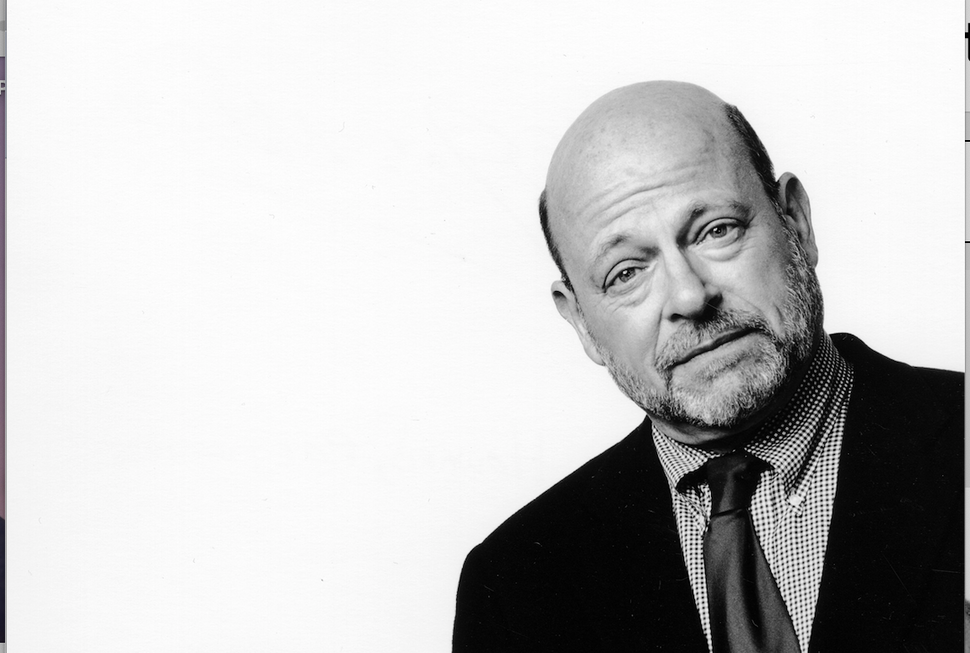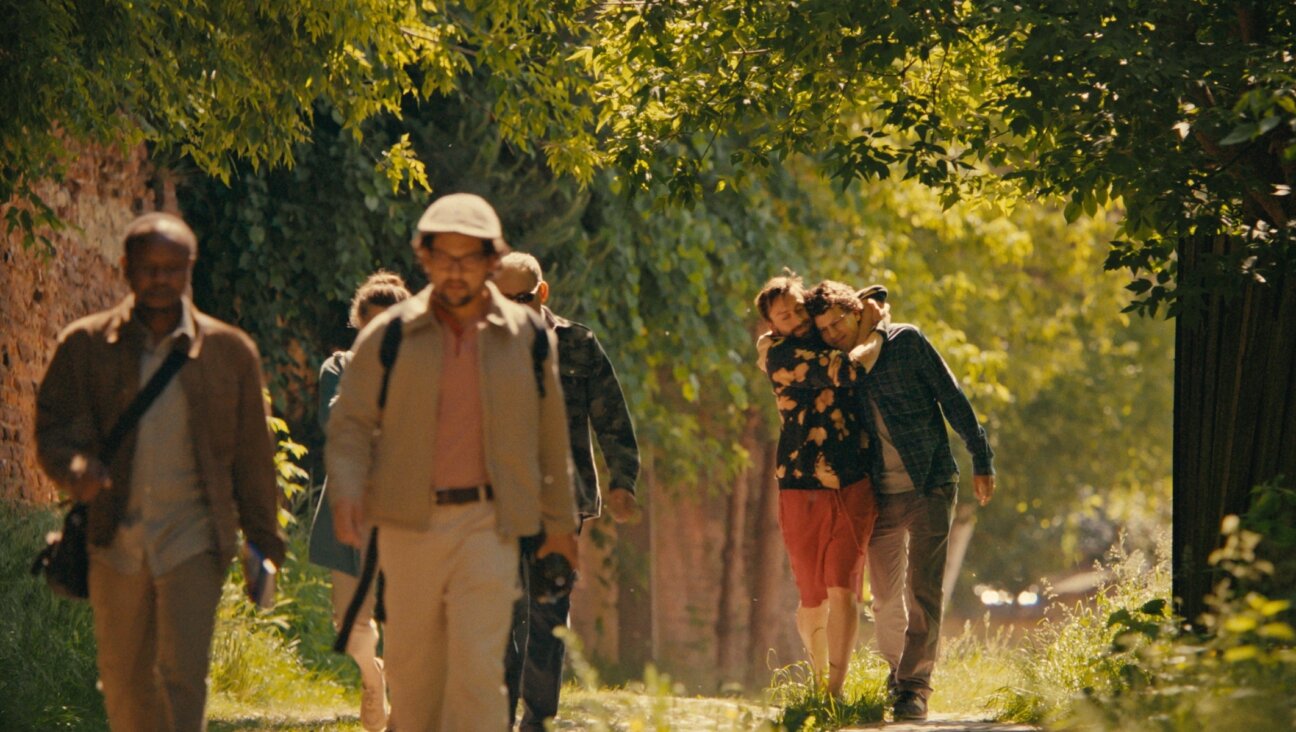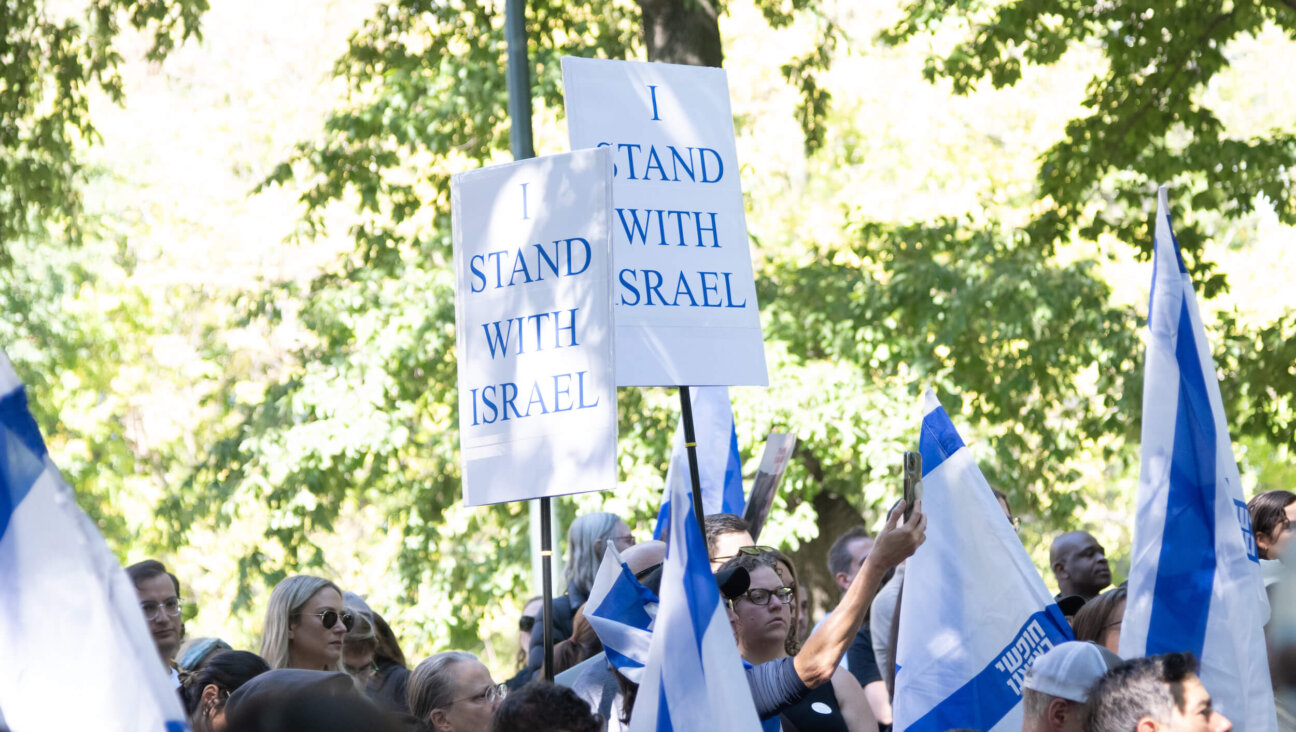A paragon of erudition and a vital poet, he captured the American gay Jewish experience

Poet Richard Howard By Getty Images
The American Jewish poet and translator Richard Howard, who died March 31 at age 92, proved that in a literary career, timing is of paramount importance. To be born less than two weeks before the 1929 stock market crash to an impoverished Jewish family in Cleveland might have seemed unlucky.
Yet Howard was promptly adopted by a more prosperous local family named Orwitz (his adopted mother would change their last name to Howard after divorcing Mr. Orwitz). Howard was raised in cultured, literate surroundings; as he told The Paris Review in 2004, his grandmother taught him to read “in response to insistent demands to do so — when I was two-and-a-half years old.”
His Jewish grandparents’ mansion also contained his grandfather’s library of European classics with fine bindings, and Howard acquired a lifelong obsession with reading books and reacting to them in his own writings.
Mastering the French language was also a matter of historical timing. Until 1936, his family vacationed each year in Germany’s Black Forest, but the rise of Nazism eliminated that option for American Jewish tourists. As Howard told his friend Susan Sontag in a 2005 public conversation, his family’s European jaunts were hampered “because we were Jews, and we were a certain kind of upper class Jew. When I was a child, until 1935, the trunks always appeared in May. “In 1936,” he added. “it was no longer possible. I remember the travel brochures for places in Austria, and we couldn’t go any longer.”
Instead they took a car trip to Florida, during which a cousin taught five-year-old Howard the rudiments of French vocabulary. Years later, he would become a prizewinning translator of such authors as Baudelaire and Jules Verne as well as the modern French Jewish writers Léon Poliakov, André Gorz, and Maurice Sachs.
Early experiences with linguistic transpositions also helped Howard’s vocations as a poet when he enrolled at Columbia University, then a center of extraordinary ferment in American Jewish cultural achievement. Among the stars on its faculty were Lionel Trilling and Meyer Schapiro two elegant and refined gentlemen hired before Jews were commonly employed by some major universities, supposedly because in their case, as the story went, “everybody knew they were Jewish, but no one could tell.”
Less subtle about expressing Yiddishkeit were Howard’s fellow students such as the poets Allen Ginsberg and Anthony Hecht, future publishers Robert Gottlieb and Jason Epstein, as well as the eminent scholar of Victorian literature John D. Rosenberg.
Howard befriended all the aforementioned diverse talents, showing a talent for companionship that would stand him in good stead in the often venomous world of New York literati. In “On the Question of American Jewish Poetry,” published in Tikkun in 1988, the American Jewish poet John Hollander, another friend and Columbia classmate, marveled at Howard’s “Alone with America,” (1969), containing 41 essays on contemporary poets.
Of these, 13 had Jewish roots, including Howard Nemerov, the unjustly neglected Howard Moss and Kenneth Koch.
Hollander added: “Howard, himself a poet of considerable distinction, also is a Jew,” observing that these writers, all aged around 40 in 1969, formed an unusually gifted pool of talent, since one generation before, considerably fewer outstanding Jewish poets had made their mark.
Once again fortuitous chronology was a key factor, when Howard landed his first job after college graduation with the Jewish American lexicographer David Guralnik. For five years, Howard labored to help Guralnik produce a dictionary. As Howard told The Paris Review, his employer was a “man with a conscience, and I certainly came to a pervasive sense of the morality of our task.”
Indeed, Guralnik, who hosted a weekly Cleveland radio program, “A Yiddish Vort” and served as vice president of The Cleveland Jewish News, battled with the staff of the Oxford English Dictionary over its antiquated definition of the word Jew, which then contained stereotypes about money-lenders. In his own dictionaries, Guralnik omitted such expletives as kike and the N-word, explaining in a preface: “It was decided in the selection process that this dictionary could easily dispense with those true obscenities.”
Learning from such moral mentors, Howard developed into a vital poet as well as an unsurpassed man of letters, translator and all-around encourager of literature, latterly as professor of practice at his alma mater, Columbia University.
Married since 2012 to the accomplished American Jewish artist David Alexander, a mainstay of Westbeth Artists Community in lower Manhattan, Howard had previously lived for some years with the American Jewish novelist Sanford Friedman.
Often seen somewhat reductively as a paragon of erudition, an omnivorous reader like the Victorian polymath George Saintsbury but with more Yiddishkeit, Howard was praised for his elaborate literary monologues in verse. Yet some readers valued even more his plainer poems inspired by personal experiences as an American Jewish gay man, whether in terms of relationship issues or more recently, a retrospective look at his childhood studies at a school for gifted children.
The endearing cover image of the last-mentioned book depicted Howard’s classmate and lifelong friend, the writer Anne Hollander, daughter of the acclaimed American Jewish pianist Arthur Loesser.
Howard managed to sustain friendships with many other writers, some of whom sought him out because he served as editor for such series as Princeton University Press’s “Lockert Library of Poetry in Translation.” Howard made available some valuable Jewish literature in that role, especially translator Peter Cole’s “Selected Poems of Solomon Ibn Gabirol”; “Selected Poems of Shmuel HaNagid”; and “The Dream of the Poem: Hebrew Poetry from Muslim and Christian Spain, 950-1492.”
On a personal level, Howard was often fascinated with Jewish women in the arts world who were considered daunting by some. So he was close to Lee Krasner, the Brooklyn-born widow of Jackson Pollock and herself an acclaimed painter, of Russian Jewish origin.
Howard was also loyal to the sometimes-difficult Diana Trilling (born Diana Rubin), widow of his former Columbia professor. Characteristically, Howard visited the elderly Trilling faithfully to read books aloud to her after her eyesight faded.
Time spent with other formidable Jewish women occasionally inspired poems, as when he wrote about chats with the political theorist Hannah Arendt in his 2005 collection “The Silent Treatment.”
Buffeted by the usual storms of book world rudeness and incomprehension, Howard never lost his sense of bonhomie and Midwestern optimism. Even when recounting mishaps that regularly occurred at publishing houses or literary journals, he rarely seemed downhearted or discouraged. Nor did he lash out in response to literary world tormentors, which might have only served to alienate anyone who was already disrespectful or ill-disposed toward him. Instead, an unsinkable equitability helped him to outlive his generation of U.S. poets and persist in a productive career well into the present century.
After the loss of his almost exact contemporary Harold Bloom in 2019, Howard was one of the last survivors of a generation of exuberant American Jewish literary minds, who read everything and contributed in a generous-spirited way to the world of letters.
Now the challenge for younger Jewish writers is to find new arbiters and exempla, as the old guard has almost entirely departed.
A message from our Publisher & CEO Rachel Fishman Feddersen

I hope you appreciated this article. Before you go, I’d like to ask you to please support the Forward’s award-winning, nonprofit journalism during this critical time.
We’ve set a goal to raise $325,000 by December 31. That’s an ambitious goal, but one that will give us the resources we need to invest in the high quality news, opinion, analysis and cultural coverage that isn’t available anywhere else.
If you feel inspired to make an impact, now is the time to give something back. Join us as a member at your most generous level.
— Rachel Fishman Feddersen, Publisher and CEO






















